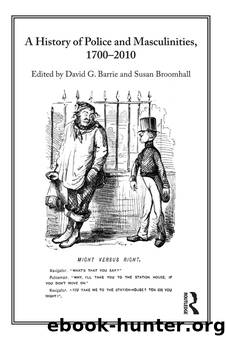A History of Police and Masculinities, 1700-2010 by David G. Barrie Susan Broomhall

Author:David G. Barrie, Susan Broomhall [David G. Barrie, Susan Broomhall]
Language: eng
Format: epub
ISBN: 9780415696616
Barnesnoble:
Publisher: Taylor & Francis
Published: 2011-12-16T00:00:00+00:00
The image of the police detective in the printed media
Detective fiction, proliferating in the Victorian period, systematically endorsed the premise that investigative work demanded intensive mental exertion, yet rejected the assumption governing the mainstream press, especially from the late nineteenth century onwards, that police detectives possessed exceptional mental traits. Although fictional private detectives, epitomized by Sherlock Holmes, embodied qualities that were âradically gendered as masculine in Victorian culture: observation, rationalism, factuality [and] logicâ,111 the bulk of fictional detective texts portrayed police detectives as incompetent, mediocre and lacking the cerebral aptitude necessary to be efficient detectives.112 To illustrate their perception of the inevitable relationship between successful investigation and reason, the figure of the private detective was invented. Far removed from any contact with reality, he (and sometimes she) was often an upper- or upper-middle-class gentleman, or at the very least a member of the proper middle classes.113 These figures were singled out as the principal crime investigators in society, whose professional stature often guided police detectives. If the police failed to follow the instructions of the private detective, they were bound to make mistakes and would be unable to decipher the case.
The extent to which this condescending portrait undermined the manly image of police detectives is difficult to assess. After all, âintellectual abilities were almost always foregrounded as the most striking differences between men and womenâ114 (and between uniformed officers and detectives). But it is reasonable to assume that although some readers saw police detection through the prism of fiction writers, notably Arthur Conan Doyle, others did not distinguish between private and public investigators and were influenced by the cerebral figure of the private detective to identify the vocation as a whole with rational thinking.115
The press, too, criticized police detectives for inefficiency, especially in response to botched cases or failure to solve well-publicized crimes. Apart from the pioneering days of police detection, this occurred most notably in the first half of the 1880s, which was marked by a tide of Fenian terror, and at the end of the decade, which was overshadowed by the inability to catch Jack the Ripper.116 Yet although newspapers occasionally (and perceptively) admitted that âchance not unfrequently [sic] does as much as headâ, and that mistakes happened, increasingly they viewed police detectives as demonstrating âprofessional scrutinyâ.117
A precursor of this trend was author-journalist Charles Dickens, who as early as the 1850s wrote about police detectives in a highly complimentary tone as impressive both physically and mentally.118 He perceived them as engaged in âgames of chessâ, setting âthemselves against every novelty of trickery and dexterity that the combined imagination of all the lawless rascals in England can devise, and to keep pace with every such invention that comes outâ.119 Gradually, as befitting men with a manly mentality, detectives were personified as shunning the manifest expression of emotions or passions â which were linked to the private sphere, the womenâs realm. As men governed by reason, they were frequently presented as coolly examining âevidences of depredationâ, identifying clues and interpreting them, and effecting âsmart capturesâ.
Download
This site does not store any files on its server. We only index and link to content provided by other sites. Please contact the content providers to delete copyright contents if any and email us, we'll remove relevant links or contents immediately.
Russia's Sakhalin Penal Colony, 1849â1917 by Andrew A. Gentes(176)
A History of Police and Masculinities, 1700-2010 by David G. Barrie Susan Broomhall(127)
Introduction to Criminal Justice - A Balanced Approach by Brian K. Payne Willard M. Oliver Nancy E. Marion(122)
Serial Killers America and UK - 2 BOOKS IN 1 by Clark Matthew(107)
Policing Gender, Class And Family In Britain, 1800-1945 by Linda Mahood(96)
Cops, Cameras, and Crisis by Michael D. White Aili Malm(90)
Restorative Justice in Transitional Settings by Kerry Clamp(88)
Dangerousness, Risk and the Governance of Serious Sexual and Violent Offenders by Karen Harrison(88)
Organized Crime and Corruption Across Borders by T. Wing Lo Dina Siegel Sharon I Kwok(84)
A Theory of African American Offending by James D. Unnever Shaun L. Gabbidon(81)
Losing Legitimacy by Gary Lafree(78)
The Real CSI by Kate Bendelow(76)
Routledge Handbook on Immigration and Crime by Holly Ventura Miller Anthony Peguero(73)
Forensic Criminology by Andy Williams(73)
The 1921 Tulsa Race Massacre by Chris M. Messer(73)
Women Exiting Prison by Bree Carlton Marie Segrave(72)
Broadmoor--My Journey Into Hell by Charlie Bronson(71)
Police Detectives in History, 1750â1950 by Clive Emsley Haia Shpayer-Makov(71)
Using Murder by Philip Jenkins(67)
